PRINCETON, NJ -- Mitt Romney is the leader for the GOP nomination among the current field of official candidates, supported by 27% of Republicans, compared with 18% for Michele Bachmann. However, Rick Perry would essentially tie Romney, with Sarah Palin and Rudy Giuliani close behind, in a scenario in which all three of these undecided candidates entered the race.
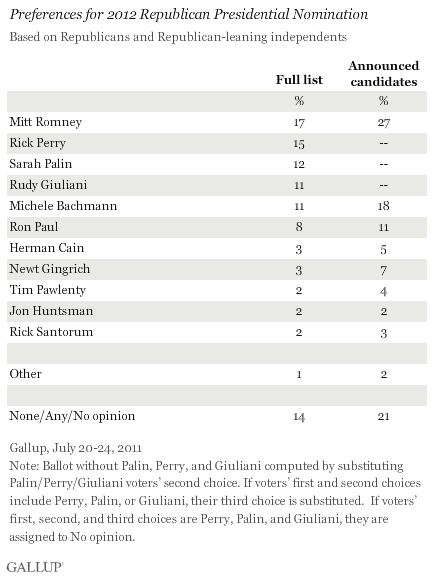
The results are based on a July 20-24 Gallup poll. Eight of the 11 Republicans included in the poll have announced their official candidacies. Giuliani, Palin, and Perry are not official candidates but are still actively considering becoming candidates even though the first nominating contests are less than seven months away. Any of the three would start from a relatively strong national position, with all registering at least double-digit support in the poll.
Gallup asked respondents to choose among all 11 current and potential candidates, and then asked for their second and third choices. The second and third choices are used to simulate preferences when certain combinations of unannounced candidates are excluded from the race. Three such scenarios include the eight announced candidates plus one of the unannounced candidates. Palin, Perry, and Giuliani finish in no worse than a statistical tie for second place when each is pitted against the eight firm candidates.
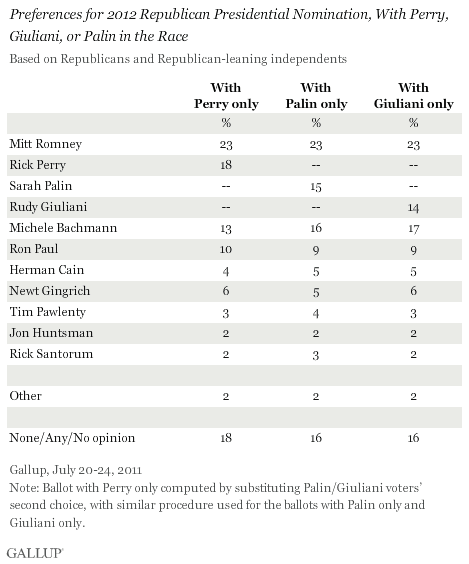
Perry appears to be the strongest potential challenger to Romney at the moment, given the results of these recomputed preferences, trailing Romney by five percentage points, compared with eight- and nine- point deficits for Palin and Giuliani, respectively. Perry is also the only one of the three late-deciders whose support numerically exceeds Bachmann's in these simulations.
The fact that Romney is the leader in all three scenarios indicates that at this point he is the nominal front-runner regardless of who else enters the race.
Bachmann Moving Up
Romney has generally led the field of announced candidates since it settled into its current form in late spring and early summer after Mike Huckabee, Mitch Daniels, Haley Barbour, and Donald Trump all decided not to run. Romney's current 27% share of the vote among the announced candidates is unchanged from early June, but is up from 19% in May.
The June update was completed just before that month's New Hampshire debate, which was the first to include most of the announced candidates. Since then, Bachmann has made the biggest move, seeing her support rise from 7% to 18%, perhaps because of her well-received performance in that debate. Most other candidates' support has held steady or shown a slight decline since June.
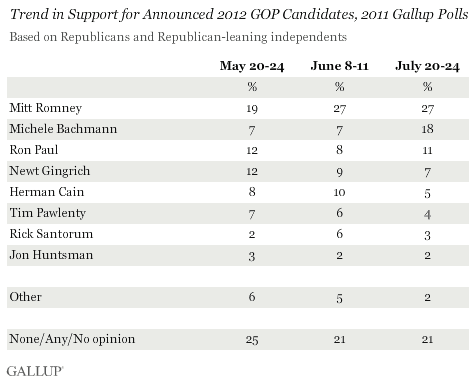
Bachmann's rise has cut Romney's lead over his closest pursuer from 17 points in June to 9 this month.
Romney still rates as the top choice of conservative Republicans (29%) and moderate and liberal Republicans (22%). Among conservatives, who outnumber liberals and moderates within the party by better than 2 to 1, Bachmann is second at 22%. Bachmann has much lower support, 10%, among moderate and liberal Republicans. Among this group, Paul is Romney's closest pursuer.
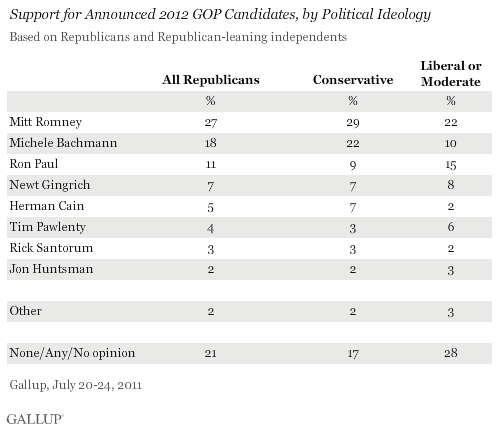
With the three potential candidates included, Romney and Perry tie at 18% as the top choice among conservative Republicans, followed by Bachmann (13%), Palin (11%), and Giuliani (9%). Giuliani (16%), Romney (14%), and Palin (14%) are the leaders among moderate and liberal Republicans, with Paul at 12%. Seven percent of moderate and liberal Republicans rate Perry as their preferred candidate.
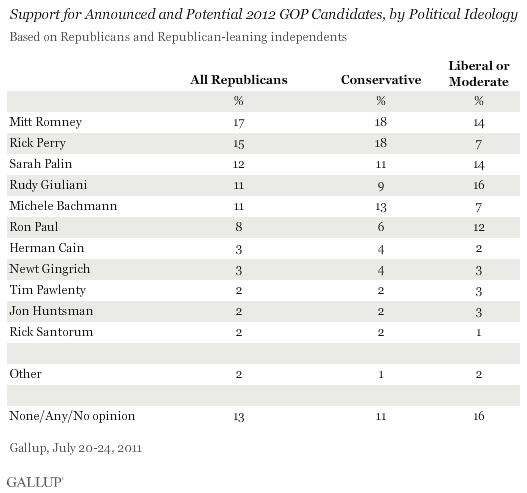
Implications
Romney is the nominal front-runner for the Republican nomination, though his status is weaker now than a month ago and could be weakened further by the entry of a candidate like Perry, Palin, or Giuliani. Still, none of those potential candidates' support exceeds Romney's at the moment.
The time for any other candidates to enter the race is running short, though there is a precedent for candidates jumping in after Labor Day, as in 2003 (Democrat Wesley Clark) and 2007 (Republican Fred Thompson), though neither candidate fared well in the early primaries and caucuses.
Survey Methods
Results for this Gallup poll are based on telephone interviews conducted July 20-24, 2011, on the Gallup Daily tracking survey, with a random sample of 1,088 Republicans and Republican-leaning independents, aged 18 and older, living in all 50 U.S. states and the District of Columbia.
For results based on the total sample of Republicans, one can say with 95% confidence that the maximum margin of sampling error is ±4 percentage points.
Interviews are conducted with respondents on landline telephones and cellular phones, with interviews conducted in Spanish for respondents who are primarily Spanish-speaking. Each sample includes a minimum quota of 400 cell phone respondents and 600 landline respondents per 1,000 national adults, with additional minimum quotas among landline respondents for gender within region. Landline telephone numbers are chosen at random among listed telephone numbers. Cell phone numbers are selected using random-digit-dial methods. Landline respondents are chosen at random within each household on the basis of which member had the most recent birthday.
Samples are weighted by gender, age, race, Hispanic ethnicity, education, region, adults in the household, and phone status (cell phone only/landline only/both, cell phone mostly, and having an unlisted landline number). Demographic weighting targets are based on the March 2010 Current Population Survey figures for the aged 18 and older non-institutionalized population living in U.S. telephone households. All reported margins of sampling error include the computed design effects for weighting and sample design.
In addition to sampling error, question wording and practical difficulties in conducting surveys can introduce error or bias into the findings of public opinion polls.
View methodology, full question results, and trend data.
For more details on Gallup's polling methodology, visit www.gallup.com.
